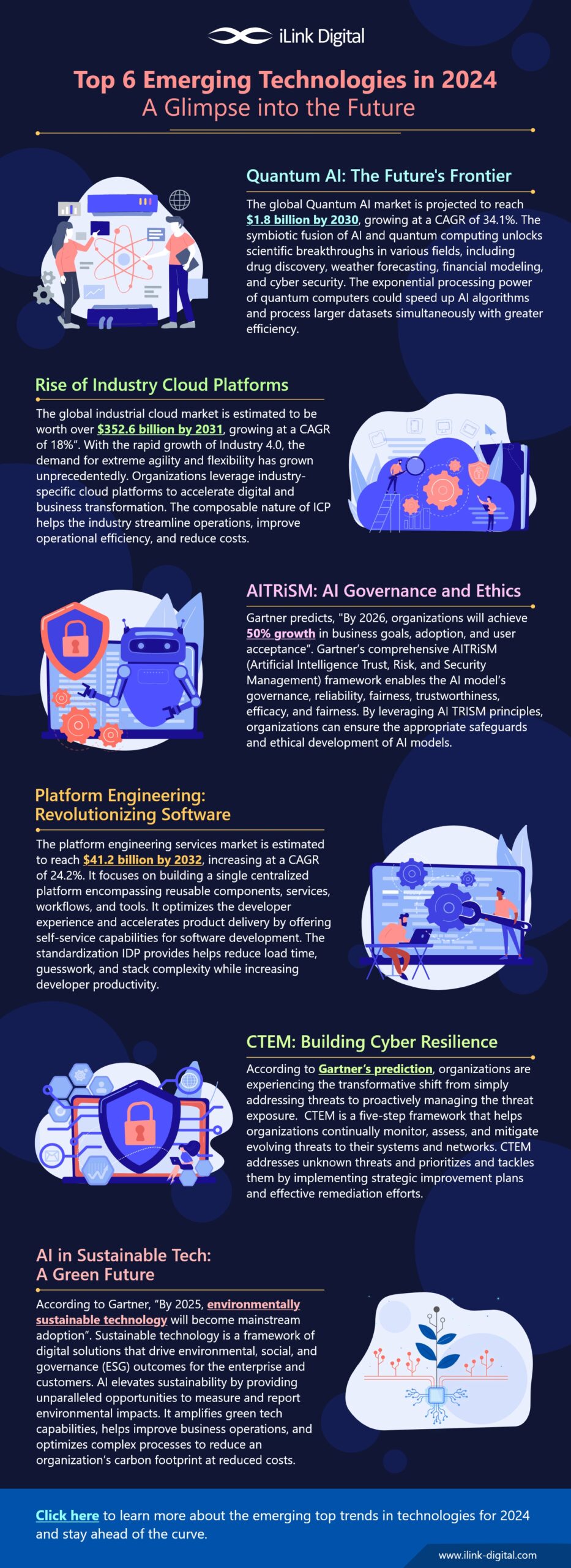Top 6 Emerging Technologies in 2024: A Glimpse into the Future
It’s that time of the year again – to explore the emerging technology trends that are set to transform businesses in 2024! As technologies are moving beyond nascent stages to become core components of business strategies, a deeper understanding of what’s coming next gives business leaders a competitive edge.
It is also a unique opportunity for businesses to evaluate their current technologies and see what to invest in to pioneer new engagement models, customer experience, and value creation. This blog aims to cover the top six strategic technology trends and help you make the most out of them. Ultimately, the key to success in this transformative era lies in seamlessly embracing and integrating these technologies into your business framework.

Quantum Computing and AI: The Next Big Leap
The demand for quantum computing has grown astonishingly due to its immense computing and processing power. Training large AI models often requires exponentially faster computing power, so quantum computers empower AI models to handle massive datasets to produce novel outputs seamlessly.
Most importantly, the convergence of quantum computing and AI can significantly speed up drug discovery, medical research, genome sequencing, and precision medicine to the next level. As it can handle high-dimensional data effectively, it plays a crucial role in cybersecurity and financial modeling. In 2024, we expect significant growth in scientific research and applications as quantum computers become more accessible.
IDC forecast says, “The worldwide quantum computing market is estimated to reach $8.6 billion by 2027, growing at CAGR of 50.9%”.
Accelerating Digital Transformation with Industry Cloud Platforms (ICPs)
Industries are increasingly adopting industry cloud platforms tailored to meet the industry’s specific requirements. Unlike the generic cloud, ICPs provide multi-cloud environments such as SaaS, PaaS, and IaaS. ICPs comprise cloud services, data management, analytics, custom applications, and next-generation technologies.
The robust cloud infrastructure helps industries to find innovative solutions and enables them to gain real-time insights into their operations. This platform allows organizations to leverage the best of every cloud provider while overcoming vendor lock-in. AWS, Salesforce, and Microsoft Azure are the leading industry cloud providers.
It gives organizations the agility and flexibility to manage workloads and quickly adapt to rapidly changing business requirements. The composable nature of ICP can help industries improve operational efficiency, reduce costs, and enhance data security. In addition, it provides easy cloud migration, better risk management, higher ROI, and compliance with industry-specific regulations.
Gartner’s report states, “Around 70% of organizations will adopt industry cloud platforms to accelerate their business operations”.
AITRiSM: Trust, Risk, and Security Management in AI Models
As businesses increasingly adopt third-party AI models, there is a growing need to incorporate security policies and frameworks to manage potential risks and prevent unforeseen issues. AITRiSM framework includes data protection measures to ensure AI models’ governance, transparency, reliability, robustness, and trustworthiness. It also focuses on risk controls over third-party inputs and outputs while using external AI solutions.
As per Gartner’s prediction, by 2026, applying AITRiSM control will increase the speed and accuracy of the AI model, providing better governance and decision-making while eliminating 80% of faulty and illegitimate information. By incorporating AITRiSM controls, organizations can take full advantage of AI’s capabilities, significantly increasing the fairness and accuracy of AI-driven models.
However, continuous monitoring is essential for AI models to ensure explainability and interpretability. As a result, businesses can maximize their outcome and value by adopting a robust AITRiSM framework.
Elevating the Software Workflow with Platform Engineering
Platform engineering has become one of the most promising trends in the cloud-native era. Gartner also listed it in their Hype Cycle for Software Engineering. It overcomes the challenges of cloud and DevOps due to its increased dependency on centralized infrastructure, which could lead to decreased productivity.
Platform engineering focuses on building a single centralized platform encompassing reusable components, services, workflows, and tools. “Internal Developer Platform” (IDP) is an integrated developer platform that provides an extensive set of tools, capabilities, and operational necessities for the entire lifecycle of an application.
Most notably, this platform optimizes the developer experience and accelerates product delivery by offering self-service capabilities for software development. IDP’s standardization helps reduce load time, guesswork, and stack complexity while increasing developer productivity.
As the technology landscape advances, the paradigm shift from DevOps to Platform Engineering is inevitable in the coming years. If appropriately used, platform engineering ensures the reliability and security of underlying infrastructure and applications, resulting in organizational agility and innovation.
Build Cyber Resilience for the Future- Continuous Threat Exposure Management (CTEM)
CTEM is a five-step framework that helps organizations identify and mitigate evolving threats to their systems and networks. Unlike traditional cybersecurity strategy, CTEM focuses on a wide range of unknown threats and prioritizes and tackles them by implementing strategic improvement plans and practical remediation efforts.
CTEM employs attack simulations to ensure the security posture of organizations and proactively identify vulnerabilities before attackers exploit them. CTEM provides enhanced cyber resilience over time by continuously assessing and monitoring the defense mechanisms of organizations, preventing financial loss and reputational damage. This paradigm shift towards cyber resilience will reduce the risk of data breaches, identity theft, and data leaks while ensuring business continuity and information security.
Role of Artificial Intelligence in Sustainable Technologies
Sustainability will become one of the biggest tech trends in 2024 due to growing concerns about energy consumption and non-renewable resources. Ultimately, technologies must be aligned with sustainability goals as they impact the environment in various ways. According to Gartner, Sustainable technology is a framework of digital solutions that drives environmental, social, and governance (ESG) outcomes for the enterprise and customers. Organizations can unlock the potential to increase operational resilience and ROI while emphasizing eco-awareness to promote sustainable fashion.
Similarly, this framework facilitates responsible business models and practices by incorporating leading-edge technologies such as AI, cloud computing, and IoT. AI elevates sustainability by providing unparalleled opportunities to measure and report environmental impacts. It amplifies green tech capabilities, helps improve business operations, and optimizes complex processes to reduce an organization’s carbon footprint at reduced costs.
Ready to Embrace the Top Emerging Technologies with iLink?
Our blog aims to shed light on the most impactful innovations on the horizon, offering insights into the transformative potential of emerging technologies. While we keep you informed about the latest trends, our true expertise lies in guiding you through leveraging these technologies for your unique needs.
Ready to embrace the future? Partner with iLink Digital for a seamless technical transition. To discuss more, please feel free to contact us!


